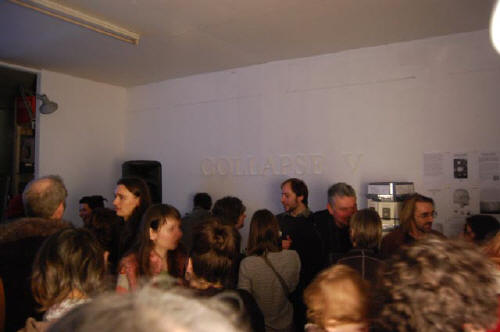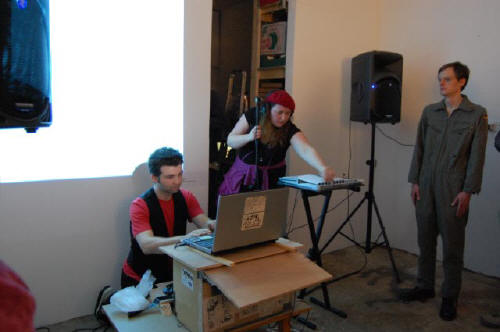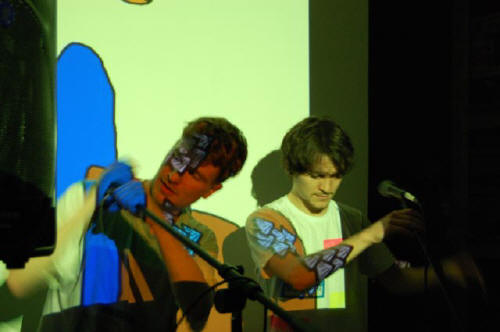|
|
| home | features | exhibitions | interviews | profiles | webprojects | gazetteer | links | archive | forum |
|
Earth Moves
Urbanomic, Falmouth 31st January, 2009
Launch Party for Collapse V 'The Copernican Imperative'
'Copernicanism tore asunder the fit between the world and man's organs: the congruence between reality and visibility'. Hans Blumenberg, The Genesis of the Copernican World
Brendan Byrne: Another Day (above)
'In his Dialogue Concerning the Two Chief World Systems, Galileo
proclaimed, through his mouthpiece Salviati, that he could 'never
sufficiently admire the outstanding acumen' of those early advocates
of Copernicanism who, 'through sheer force of intellect' - that is,
without even the benefit of a telescope to confirm the theory
observationally - 'had done such violence to their own senses as to
prefer what reason told them over that which sensible experience
plainly showed them to the contrary'.
Since Galileo published his work in 1632, recognition of the deeply counterintuitive nature of scientific findings has become virtually commonplace, and the 'explanatory gap' between the 'manifest' and 'scientific' images of reality has long been a central concern for philosophers and philosophically-minded scientists alike. In this volume of Collapse, we bring together samples of the most intellectually challenging contemporary work devoted to exploring the philosophical implications of 'Copernicanism' from a variety of overlapping and complementary standpoints. As in previous volumes, the involvement in Collapse V of several prominent scientists alongside major contemporary artists and groundbreaking philosophers and is designed to open up new perspectives and new directions for thinking outside disciplinary constraints. From multiple philosophical and artistic perspectives, and from scientific fields as diverse as theoretical physics and cosmology, biology, mathematics, cognitive neuroscience, and astrobiology, the volume addresses the issues of the 'deanthropomorphisation' of reality initiated by the Copernican Revolution, the relation between scientific and philosophical (Kantian) 'Copernicanism', and the enduring gulf between the spontaneous image of the world bequeathed to us by evolution and that revealed by the physical sciences in the wake of Copernicus. With several of the contributions in the form of in-depths interview, Collapse V: The Copernican Imperative is an accessible and thought-provoking volume exemplifying that characteristic blend of speculative audacity and scientifically informed insight which has always been the hallmark of 'Copernicanism'.
Timothy Crowley (above) Oddstep Deployment Unit (above) Hedluv + Passman (above and below)
Collapse V: The Copernican Imperative includes contributions from: Carlo Rovelli, Julian Barbour, Conrad Shawcross, James Ladyman, Thomas Metzinger, Jack Cohen and Ian Stewart, Milan Cirkovic, Keith Tyson, Nick Bostrom, Martin Schonfeld, Immanuel Kant, Iain Hamilton Grant, Nigel Cooke, Alberto Gualandi, Paul Humphreys, and Gabriel Catren.
Contents are as follows:
In Anaximander's Legacy, theoretical physicist Carlo Rovelli
(co-founder of Loop Quantum Gravity and author of Quantum
Gravity) charts the historical dynamics of science's ever more
radical overturning of the commonsense image of the world from
Anaximander through Copernicus to the 'unfinished revolution' of
twentieth-century physics - a revolution which, suggests Rovelli,
challenges us to find a way of understanding the world in the absence
of the familiar stage of space and time.
Rovelli's question 'Can we think the world without time?' is one which
has preoccupied renegade theoretical physicist and historian of
science Julian Barbour (author of Absolute or Relative
Motion? and The End of Time) for the best part of five
decades. In our interview The View From Nowhen we discuss the
nature of his radical rethinking of the foundations of physics, his
arguments for the non-existence of time and change, and the influence
his ideas have exerted on contemporary quantum gravity research from
outside the halls of academe.
In his contribution to the volume, Turner Prize winning artist Keith Tyson - well known for his intricate and provocative artistic displacements and extrapolations of scientific ideas - presents a Random Sampler from a Blocktime Animation. In Alien Science, our interview with Jack Cohen and Ian Stewart (authors of dozens of ground-breaking popular science books, including their co-authored works The Collapse of Chaos, Figments of Reality, and What Does A Martian look Like?), we discuss with them the continuing collaboration between mathematician and biologist; the key conceptual innovations of their co-authored works; their trenchant criticisms of what they see as the overly conservative and unimaginative nature of contemporary astrobiology; and their positive programme for a new science of alien life, beyond astrobiology, which they call 'xenoscience'. In Sailing the Archipelago, cosmologist and astrobiologist Milan Cirkovic provides a sophisticated defence of anthropic reasoning (understood in terms of 'observation selection effects') against the charges brought against it by the likes of Cohen and Stewart as part of an ambitious project of laying the 'philosophical groundworks' of the nascent science of astrobiology. In Where Are They?, philosopher and transhumanist Nick Bostrom (Director of Oxford University's Future of Humanity Institute, author of Anthropic Bias: Observation Selection Effects in Science and Philosophy) revisits Fermi's Paradox, employing probabilistic 'anthropic' reasoning to motivate the conclusion that, far from being a cause for celebration, the discovery of extra-terrestrial life would in fact augur very badly for the future of the human race. In his (2006) motion-sculpture Binary Star artist Conrad Shawcross gestured beyond Copernicanism, suggesting that life in a solar system where there is 'no such thing as one' would disturb fundamental epistemological assumptions. Exploring the Shadows of Copernicanism in his work over the last decade, Shawcross, with editor Robin Mackay investigates its relationship with the philosophical trope of Copernicanism, and previews his latest work Chord, to be unveiled in 2009. In an interview charting the journey from Copernicanism to Enlightenment 2.0, Thomas Metzinger (philosopher of neuroscience, author of Being No One) discusses his 'self-model theory of subjectivity', the potential social and cultural ramifications of the findings of contemporary neuroscience, and responds to criticisms of his radical eliminativist position with regard to the existence of 'selves'. In his Thinking Outside the Brain, philosopher Paul Humphreys (author of Extending Ourselves: Computational Science, Empiricism, and Scientific Method) proposes that computational science is fast displacing humans from the centre of the epistemological universe, speculates on the possibility of a 'science without humans', and presents his proposals for a radically non-anthropocentric empiricism. The paintings of Nigel Cooke present a meticulously conceived landscape of painting. His contribution, in the form of a new series of paintings Thinker Dejecta, suggests a kinship between his figure of the vagrant painter at the end of representation, and that of the dejected thinker whose insights only succeed in displacing him further from the centre. In our fourth and final interview, Who's Afraid of Scientism?, James Ladyman (philosopher of science, co-author of Every Thing Must Go: Metaphysics Naturalised) discusses the forlornness of contemporary analytic metaphysics and the prospects for a radically naturalised metaphysics which would fully take on board the most counterintuitive findings of contemporary physics, finally dispensing with the habitual ontology of 'little things and microbangings' which continues to hold sway in contemporary 'pseudo-naturalist philosophy'. In his The Phoenix of Nature, Martin Schonfeld (artist and philosopher of nature, author of The Philosophy of the Young Kant) presents us with a vivid picture of Immanuel Kant profoundly at odds with the recent popular characterisation of him as a conservative, anti-Copernican thinker, via a stimulating exploration of his early cosmology. Here we are presented a radically anti-anthropocentric, anti-Christian, naturalist, speculatively audacious Kant who pushes 'Copernicanism' to its limits; who abolishes the hand of God from, and introduces a history and evolution into, the Newtonian cosmos; and who as early as 1755 strongly anticipates the fundaments of what became the Standard Model of modern cosmology only in the 1930s.
To accompany his piece Schonfeld also contributes a new translation of
Immanuel Kant's Concerning Creation in the Total Extent of
its Infinity in Both Space and Time, an extended excerpt from his
1755 Universal Natural History and Theory of the Heavens in
which his astonishingly prescient cosmology of 'island universes' and
the birth and death of 'worlds' is most magnificently and perfervidly
portrayed.
Tackling the great philosophical 'Copernican Revolution' head-on,
Iain Hamilton Grant (philosopher, author of Philosophies of
Nature after Schelling) examines the Prospects for
Post-Copernican Dogmatism in the light of the 'antinomies' of
naturalism.
In A Throw of the Quantum Dice Will Never Overturn the Copernican
Revolution, Gabriel Catren (Director of the project 'Savoir
et Systeme' at the College International de Philosophie, Paris)
presents what he calls a 'speculative overcoming' of recent
influential quasi-Kantian interpretations of quantum mechanics. Rather
than being limited to a mathematical account of the correlations
between 'observed' systems and their 'observers', or pointing to the
inherent 'transcendental' limits of physical knowledge, Catren argues
that quantum mechanics furnishes a complete and realistic description
of the intrinsic properties of physical systems, an ontology which
exemplifies the Copernican deanthropomorphisation of nature.
In Errancies of the Human: French Philosophies of Nature and the
Overturning of the Copernican Revolution, Alberto Gualandi
(philosopher, author of Deleuze and Le probleme de la verite
scientifique dans la philosophie francaise contemporain) indicates
the features common to certain speculative philosophies of nature in
1960s France and problems facing contemporary evolutionary biologists'.
Thanks to Lesley Ayers for
the photographs
6/2/09 |
|
|



